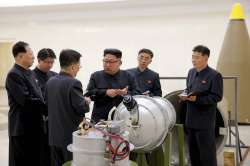North Korea confirms hydrogen bomb test; says it was ‘perfect success’
North Korea detonated a hydrogen bomb with "perfect success", its state media said today, adding that the device was capable of being loaded onto its long-range missiles

North Korea on Sunday said that in what could be the most powerful detonation, it successfully conducted a test of a hydrogen bomb that can be loaded onto a intercontinental ballistic missile (ICBM), state-media media reported.
It is the country's sixth-ever test of a nuclear weapon and the first since US President Donald Trump took office, reports CNN.
In an "important" announcement, North Korea said it carried out the test at 12.00 p.m. (local time), and called it a "perfect" success, reports Yonhap News Agency.
"The hydrogen bomb test was carried out to examine and confirm the accuracy and credibility of the power control technology, and internal structural design newly introduced into manufacturing the hydrogen bomb to be placed as the payload of the ICBM," the Korean Central News Agency (KCNA) said.
The announcement came hours after an artificial earthquake measuring 6.3 on the Richter scale, according to the US Geological Survey, was detected in the country's northeast, not far from the Punggye-ri nuclear test site.
The Korea Meteorological Administration initially put the scale of the earthquake at magnitude 5.7. and said that the seismic wave was recorded at 12.36 p.m.
The tremors were at least 10 times more powerful than the fifth test conducted last September, which caused a 6.3 magnitude quake, according to Japanese officials.
Lassina Zerbo, the executive secretary of the Comprehensive Nuclear-Test-Ban Treaty Organisation, said that more than 34 stations picked up the seismic activity from the blast.
Tremors could be felt as far as Vladivostok, Russia, one resident told CNN.
Japanese Foreign Minister Taro Kono was the first to confirm the existence of the test based on data provided by the Japan Meteorological Agency.
Prime Minister Shinzo Abe said that a nuclear test would not be tolerated.
South Korea's presidential office immediately convened a National Security Council meeting on the issue.
The country's Joint Chief of Staff said all South Korean troops have been put on high alert, with North Korea scheduled to commemorate its founding anniversary later this week, reports Yonhap News Agency.
The test was conducted after a KCNA report said earlier on Sunday that North Korean leader Kim Jong-un inspected a hydrogen bomb being loaded onto an ICBM after Pyongyang claimed to have made a "more developed nuke", which is more powerful than an atomic bomb.
Hydrogen bombs use fusion -- the merging of atoms -- to unleash huge amounts of energy, whereas atomic bombs use nuclear fission, or the splitting of atoms.
Since 2006, North Korea has carried out five nuclear tests, including two last year.
The country has defied UN sanctions and international pressure to develop nuclear weapons and to test missiles which could potentially reach the mainland US.